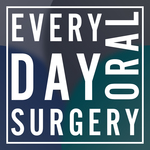I was recently invited to give a talk to a large group of general dentists on how they can work more effectively with their oral surgeon.
The presentation went well, but one part stood out to me: the discussion on post-op visits.
The Problem of Overreaction
Too often, especially with younger dentists, a patient will return for a post-op check and the dentist sees something concerning—say, the superficial layer of a bone graft or membrane sloughing off. To the inexperienced eye, this looks like a major failure. The dentist might say something like:
“This looks bad. The graft probably failed. It may need to be redone.”
The truth is, in the majority of cases, the graft is healing fine and future implant placement is not at risk. But once the patient hears words like failure or redo, they panic.
When they then see the surgeon, who reassures them that healing is progressing normally, the patient is confused and emotionally drained.
Why This Matters
There are two major problems that come from this scenario:
1. A Healing Problem
Studies show that the way a doctor frames complications directly impacts patient recovery.
-
If a provider acts alarmed, unsure, or overly negative, patients suffer more.
-
If the same situation is explained calmly, with confidence and reassurance, patients recover more quickly and predictably.
🗣 Words matter. Tone matters. The body listens to the mind.
2. A Trust Problem
When one provider alarms a patient and another contradicts them, trust is broken.
-
The patient may doubt the surgeon (“He’s just brushing this off”), or
-
They may lose faith in the dentist (“Why did she scare me if it’s fine?”).
Either way, the patient feels caught in the middle—and trust in the team suffers.
Another Common Example
A patient comes in at one week post-op complaining of lip numbness.
-
An inexperienced dentist might say, “This is a big problem. You need to see the surgeon immediately.”
-
The patient panics, convinces themselves it’s worse than it is, and believes it will never improve.
But in reality, most cases resolve with time. What the patient needs most is reassurance, not alarm.
The Takeaway
As dentists and surgeons, we’re on the same team. Our words carry weight, not just in how patients feel emotionally but in how they heal physically.
-
Use calm, confident language when addressing complications.
-
Avoid jumping to conclusions before consulting the surgeon.
-
Remember: what we say can either help a patient heal—or unintentionally make things harder.
Reflection Questions
-
How do I usually talk to patients about complications or unexpected findings?
-
Have I ever unintentionally caused alarm with my wording or tone?
-
What strategies can I use to project calm confidence—even when I’m unsure?
-
How do I support my patients while also maintaining trust with the surgeon?
Action Items
✅ Pause before speaking. Ask yourself if what you’re about to say will reassure or alarm.
✅ Stick to observable facts. Instead of declaring failure, describe what you see and explain that the surgeon will evaluate it further.
✅ Use reassuring language. Phrases like “This can be part of the normal healing process” go a long way.
✅ Build a team approach. Remind patients that you and their surgeon are working together to ensure the best outcome.
✅ Seek mentorship. If you’re unsure how to phrase things, talk with experienced colleagues or your local surgeons for examples.

